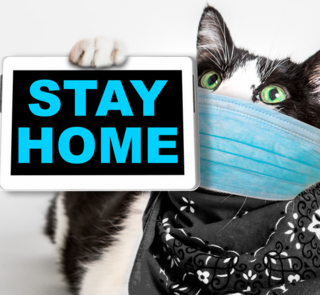Animal Behavior
Why Do People Risk Their Own Health for Their Pets?
New study of pet owners who would refuse or delay COVID testing or treatment.
Posted October 24, 2020 Reviewed by Kaja Perina

On the morning of August 10, 2005, in anticipation of the arrival of Hurricane Katrina, Ray Nagin, the mayor of New Orleans, issued a mandatory evacuation order. Between 150,000 and 200,000 people, however, refused to leave their homes. A couple of months later, researchers from the Fritz Institute interviewed individuals who elected to sit out the “storm of the century.” They found that 19% of people who disobeyed the evacuation order refused to flee because they did not want to leave their pets behind.
Today, we confront a disaster vastly greater than any hurricane: COVID-19. Do concerns for our pets affect health decisions in the face of a pandemic like they did for many of the victims of Katrina?
A team of researchers led by Jennifer Applebaum at the University of Florida, in collaboration with Virginia Commonwealth University, addressed this issue. Their results were recently reported in the journal One Health. They surveyed 1,356 American pet owners about how their companion animals influenced their decisions to get a COVID test and or undergo treatment for COVID. Their results reveal why some people might risk their own health to protect their pets.
What They Did
The respondents were recruited through social media and Internet interest groups related to companion animals. As is usually the case with internet surveys on animal issues, most of the participants were women. They were asked two critical questions:
“If you thought you had COVID-19, would you delay or avoid testing because you were worried about your pet’s welfare?”
And: “If you thought you had COVID-19, would you delay or avoid treatment because you were worried about your pet’s welfare?”
The response options for both questions were “Yes,” “No,” “Maybe,” or “I don’t know.” (In their analyses, the researchers combined the “Maybe” and “I don’t know” responses into an “Uncertain” category.)
Pet owners who answered “Yes” or “Maybe,” to the questions were then asked to respond to an open-ended question: “Please explain more about your decision to avoid testing or treatment for COVID-19 because you were worried about your pet.”
The respondents also completed a standardized pet attachment scale, a measure of social support, and a series of demographic questions. They were also asked if they were worried about losing income due to the pandemic.
What They Found
- Nearly one in 10 participants indicated that they were uncertain (7%) or would definitely (2%) delay or avoid getting a COVID test because of concern for their pet’s welfare.
- Ten percent were uncertain as to whether they would delay or avoid treatment for COVID because of their pet, and 2% were sure they would delay or avoid treatment for COVID.
- As you would predict, people who were highly attached to their pets were more likely to say they would avoid getting tested or getting treatment for COVID.
- Pet owners who were worried about losing income because of COVID were also more likely to say they might not get tested or treated for pet welfare reasons.
- In contrast, pet owners with strong human support systems were less inclined to avoid or delay COVID testing due to animal welfare concerns.
Why Would People Risk Their Own Health for Their Pets?
Perhaps the most interesting findings were related to responses to the open-ended question on why they would consider delaying or not getting tested or treated for COVID to protect their pets. Their answers fell into three categories.
Concerns About Pet Accommodations. Nearly 90% of pet owners said they would delay or not get tested or treated because of problems finding accommodations for their pets. Forty percent of them had no plan about what to do with their pets if they got sick, and many said they would not look for pet accommodations until they got sick. As one pet owner wrote, “Depends on symptoms. I may delay hospitalization until I find a reliable place to care for my pet.”)
Concerns for the Care of the Pet. Forty percent of people who would delay/avoid testing and treatment were worried about the quality of pet care. In some cases, this was because their pets had special needs. For example, one owner wrote, “My dog is a management case for reactivity to people and other dogs and can only be watched by very few select people. I’d be concerned they could not watch her for some reason and I would have absolutely no other option.”
Concerns About Themselves and Other People. The final category of reasons (40%) were related to concerns about humans, though some of these were also related to companion animals. In some cases, owners could not bear to be separated from their pets. (“If my husband and I both had [COVID] we would not leave our pets.”). In other cases, people did not want to impose their pets on others. (“I don’t really have anyone to take care of my pets. It feels like a burden to ask friends and, expensive to hire someone.”
In a few cases, pet owners had come down with COVID and described real situations in which they had to make tough decisions. One woman wrote, for example, “I delayed going to the hospital for COVID symptoms because I was worried no one would be there for my dog. I live with my husband but he isn’t very good at taking care of our dog.”
Why This Research Is Important
By one estimate, 25% of Hurricane Katrina deaths in Mississippi’s coastal counties were residents who stayed behind because of their pets. In 2006, in the wake of Katrina, Congress enacted the Pets Evacuation and Transportation Act (PET Act) which required states requesting FEMA assistance in response to natural disasters to accommodate pets in evacuation plans.
Based on the findings of their survey, Jennifer Applebaum and her colleagues argue that “pets matter in health-care decision-making, particularly in acute emergencies like COVID-19.” Pet owners, they maintain, should go ahead and plan for their pets in case they are hospitalized or incapacitated. But, they also believe that communities and social service agencies play a role. They write, “In the interest of public health, we recommend community collaboration to provide services and resources to circumvent obstacles that arise for people and their pets during public health emergencies.”
Makes sense to me.
Facebook image: Vitalii Matokha/Shutterstock
References
Applebaum, J. W., Adams, B. L., Eliasson, M. N., Zsembik, B. A., & McDonald, S. E. (2020). How pets factor into healthcare decisions for COVID-19: A one health perspective. One Health, 100176.




